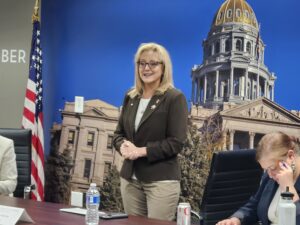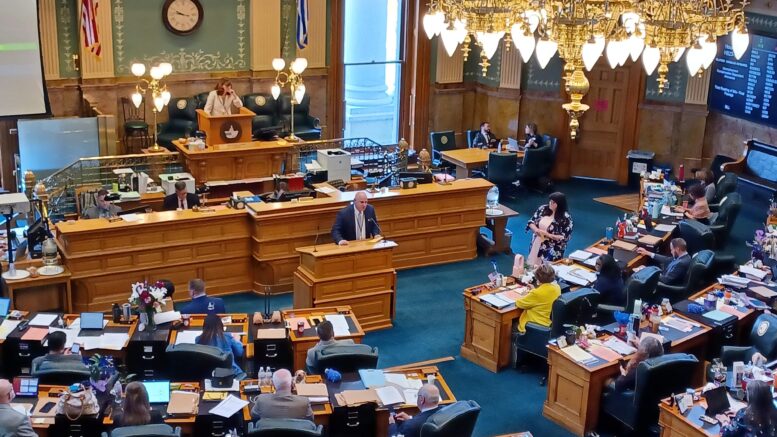The makeup of Colorado’s Legislature is beginning to look a bit different than it appeared it would look when election night wrapped up one month ago.
Secretary of State Jena Griswold announced late Thursday that recounts have found that Republican candidates flipped two seats in the House that Democrats appeared to have held when the initial rounds of ballot-counting had finished. With those two seats, Republicans would end the veto-proof supermajority that Democrats held in that chamber the past two years, though the majority party still holds a dominant 43-22 edge in seats.
And while numbers in the Senate have not changed since election night — Democrats still will hold a 23-12 edge in seats, one short of a supermajority — the actual members of that chamber of the Legislature are in flux. Two Democrats have announced in the past month that they are resigning their seats, and one Republican also is leaving after being elected to the Douglas County Commission.
House recounts

Rebecca Keltie speaks at a Colorado Chamber of Commerce event.
In addition to Republican Rep.-elect Ryan Gonzalez flipping the Greeley-area seat that had been held by Democratic Rep. Mary Young, the GOP won back the seat held by Democratic Rep. Stephanie Vigil and an open seat that was held by Democratic Rep. Jennifer Parenti. Griswold announced that former Rep. Dan Woog recaptured by 110 votes the House District 19 seat that he’d lost to Parenti two years ago, and Rebecca Keltie ousted Vigil from her Colorado Springs-based seat by just three votes out of 41,729 ballots cast.
Holding three fewer seats in the House means Democrats will not be able to override vetoes, put constitutional amendments onto the ballot or pass rules without some measure of Republican support. In practicality, that means the limits the majority party put on debate lengths in the past two years can’t occur without agreement from Republicans, which likely will involve more negotiation and compromise between the parties.
“With the growth of the Republican caucus, voters have rejected the leftward drift of the Colorado Legislature, and Colorado voters have now given us a louder voice to make that stand,” Assistant House Minority Leader Ty Winter, R-Trinidad, said in a statement.
Vigil told Colorado Politics that she intends to examine her legal options to challenging the final count in her election, however, meaning that the HD 16 battle may not be over.
Senate moves affect both chambers of Legislature

Colorado state Sen. Janet Buckner speaks in the well of the Senate.
The implications of potential changes in personnel to the Senate remain less clear.
Sen. Chris Hansen, D-Denver, said shortly after the election that will resign on Jan. 9, the second day of the session, to take a job as CEO of the Durango-based La Plata Electric Association, which will mean that a Democratic vacancy committee will replace him. Media outlets reported that at least eight people have expressed interest in Hansen’s job — including two House members, Rep. Steven Woodrow and Rep.-elect Sean Camacho, whose selections would spur another vacancy committee for their seats.
Then, Sen. Janet Buckner, D-Aurora, announced several weeks after her re-election that she would step aside, saying that she needed to concentrate on her family. Rep. Iman Jodeh is seeking Buckner’s seat through a vacancy committee expected to be held just before the Jan. 8 start of the legislative session, and if she is chosen, that again would create a domino effect of another committee needing to replace her.
And Sen. Kevin Van Winkle, R-Highlands Ranch, is joining his colleagues in stepping aside on Jan. 9 so that he can take his seat as a newly elected member of the Douglas County Commission. No Republican House members have expressed interest in ascending to Van Winkle’s seat, meaning that just one vacancy committee should be enough to fill that opening.
What Hansen meant to Legislature

Colorado state Sen. Chris Hansen discusses a bill on the Senate floor during the 2023 session.
Of all the resignations, Hansen’s may create the most intrigue for the business community. The senator, who ascended to the chamber to fill a vacancy in 2021 after being elected to the House in 2016, has sponsored some of the most significant pieces of legislation in recent years.
Sometimes Hansen’s bills have vexed business leaders, such as his unsuccessful measures from this past session to increase the taxation level for short-term rental properties and to establish a fee on alcohol sales to fund treatment programs. Sometimes they’ve earned widespread praise, such as his steering of two different property-tax reduction measures during the regular and special sessions this year.
And often, the renewable-energy advocate has put forth bills that business leaders blanched at originally because of their regulatory increases but worked with them to find compromises and concessions that made such bills palatable if not fully supported. His efforts included laws that sped up the goal to reach net-zero emissions by 2050 and that changed the Oil and Gas Conservation Commissionto the Energy and Carbon Management Commission to position it to deal with new carbon-management technology.
Hansen said he felt the opportunity to lead one of the state’s largest electric cooperatives was too important to turn down, particularly as it will allow him to oversee changes his bills helped to put into place, like redesigning the grid to accommodate more electricity usage. While it was not an easy decision, he said, he expects that other legislators will take up some of his unfinished business, particularly efforts like his tax-reform bills that he worked on this summer.
“Legislatively, I certainly will miss the Senate,” he said.
